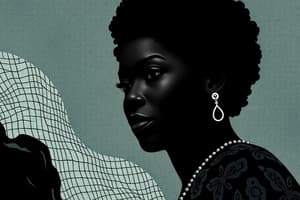Podcast
Questions and Answers
What type of statement is reflected in the quotation about being outdoors and seeing a child drowning?
What type of statement is reflected in the quotation about being outdoors and seeing a child drowning?
- declarative
- exclamatory (correct)
- imperative
- interrogative
What does the woman's accusation of 'You killed my baby!' reflect?
What does the woman's accusation of 'You killed my baby!' reflect?
Racial prejudice or desperation
What does the phrase 'whites faceless, voiceless, clouded by violence' convey?
What does the phrase 'whites faceless, voiceless, clouded by violence' convey?
Loss of identity and agency in the face of violence
What is the significance of the phrase 'Present day link' in the context of trauma?
What is the significance of the phrase 'Present day link' in the context of trauma?
What sentiment is expressed in the statement about 'humouring' oneself?
What sentiment is expressed in the statement about 'humouring' oneself?
What is the implication of 'brushing over problems' as mentioned in connection to the quote about washing away mud?
What is the implication of 'brushing over problems' as mentioned in connection to the quote about washing away mud?
What does the statement about having a child respond to questions represent?
What does the statement about having a child respond to questions represent?
What does the boy's defensive statement imply about his environment?
What does the boy's defensive statement imply about his environment?
What does the quote about the boy being at ease with the narrator suggest?
What does the quote about the boy being at ease with the narrator suggest?
What social issue is highlighted in the dialogue about the use of the racial slur?
What social issue is highlighted in the dialogue about the use of the racial slur?
What does the boy's understanding of revenge indicate?
What does the boy's understanding of revenge indicate?
The boy called for help when he was in more ______ than he could handle.
The boy called for help when he was in more ______ than he could handle.
The whip mentioned was used on both ______ and horses.
The whip mentioned was used on both ______ and horses.
What realization does the character have about the boy's presence?
What realization does the character have about the boy's presence?
What does the quote about 'free papers' imply about the status of blacks?
What does the quote about 'free papers' imply about the status of blacks?
What metaphor is conveyed in the mention of darkness and woods?
What metaphor is conveyed in the mention of darkness and woods?
Who does the character identify as their relatives in the darkness?
Who does the character identify as their relatives in the darkness?
What feeling is expressed when pain brings the character back to consciousness?
What feeling is expressed when pain brings the character back to consciousness?
What does the phrase about the anchor imply?
What does the phrase about the anchor imply?
Flashcards are hidden until you start studying
Study Notes
Quotations and Analysis
-
"Suddenly I was outdoors kneeling on the ground beneath trees..." highlights the sudden transition from one reality to another, underscoring the urgency and danger of rescuing a drowning child.
-
The exclamatory nature of the quote emphasizes immediate panic and the outcry of desperation.
-
"Then, suddenly, the woman began beating me..." introduces themes of racial prejudice and the reaction of individuals in extreme emotional distress, questioning whether her actions stem from racism or sheer desperation.
-
"I turned, startled, and found myself looking down the barrel of the longest rifle..." illustrates the intense fear and helplessness faced in threatening situations, painting a vivid picture of the violence and power dynamics at play.
-
"I worried bitterly whether he was worried about my vanishing again or my sanity..." reflects connection to modern mental struggles, depicting the lingering effects of trauma and doubt in personal relationships.
-
"Hell, I don't blame you for humouring me..." indicates self-doubt and the confusion of reality, raising questions about internal belief and the impact of past traumas on present perceptions.
-
"I showered, washed away the mud and the brackish water..." symbolizes the struggle to escape trauma, suggesting that superficial cleansing does not address deeper emotional scars.
-
"And wherever I was there was a child with me..." suggests a search for truth and understanding through the innocence and openness of youth, implying that children may reveal more than adults.
-
"The boy stumbled back from me, alarmed..." conveys the immediate apprehension towards strangers in the South, indicating historical tensions and the instinctual division between races.
-
"But he did seem surprisingly at ease with me..." builds suspense as it introduces unexpected comfort, contrasting the typical distrust associated with strangers.
-
"Your mother always call black people n****** Rufe?" addresses institutionalized racism and the innocence of a child's upbringing, presenting a chilling look at how prejudices are transmitted through families.
-
"The boy already knew more about revenge than I did..." reveals the impact of familial violence, showing that cruelty is learned and affects children in profound ways.
-
"So he had called me. I was certain now..." suggests a mysterious connection that transcends time, hinting at a deeper bond established through shared experiences of trouble.
-
"Did you say he used a whip on you Rufe?" navigates the painful intersections of race and violence, highlighting historical context of oppression while drawing parallels between different forms of trauma.
-
"I hadn't realised how comforting the boy's presence had been..." emphasizes the vital role of companionship in overcoming fear and trauma, stressing the need for emotional anchors.
-
"Blacks here were assumed to be slaves unless they could prove they were free..." illustrates the historical context of slavery, emphasizing the systemic oppression faced by African Americans.
-
"Dangerous as they could be to me, somehow, they did not seem as threatening as the dark, shadowy woods..." reinforces fear as a central theme while contrasting the known dangers of people with the unknown dangers of the wilderness.
-
"She stopped, peered at me through the darkness. She was Alice, then..." connects the protagonist to her ancestry, presenting the idea of inheritance and refuge among familiar figures despite the surrounding chaos.
-
"Pain dragged me back to consciousness..." employs personification to emphasize the physical and emotional toll of trauma, highlighting the pervasive nature of suffering.
-
"I moved closer to him, relieved, content with even such grudging acceptance..." underscores the significance of acceptance and solidarity, portraying the crucial human need for connection during distressing times.
Studying That Suits You
Use AI to generate personalized quizzes and flashcards to suit your learning preferences.




